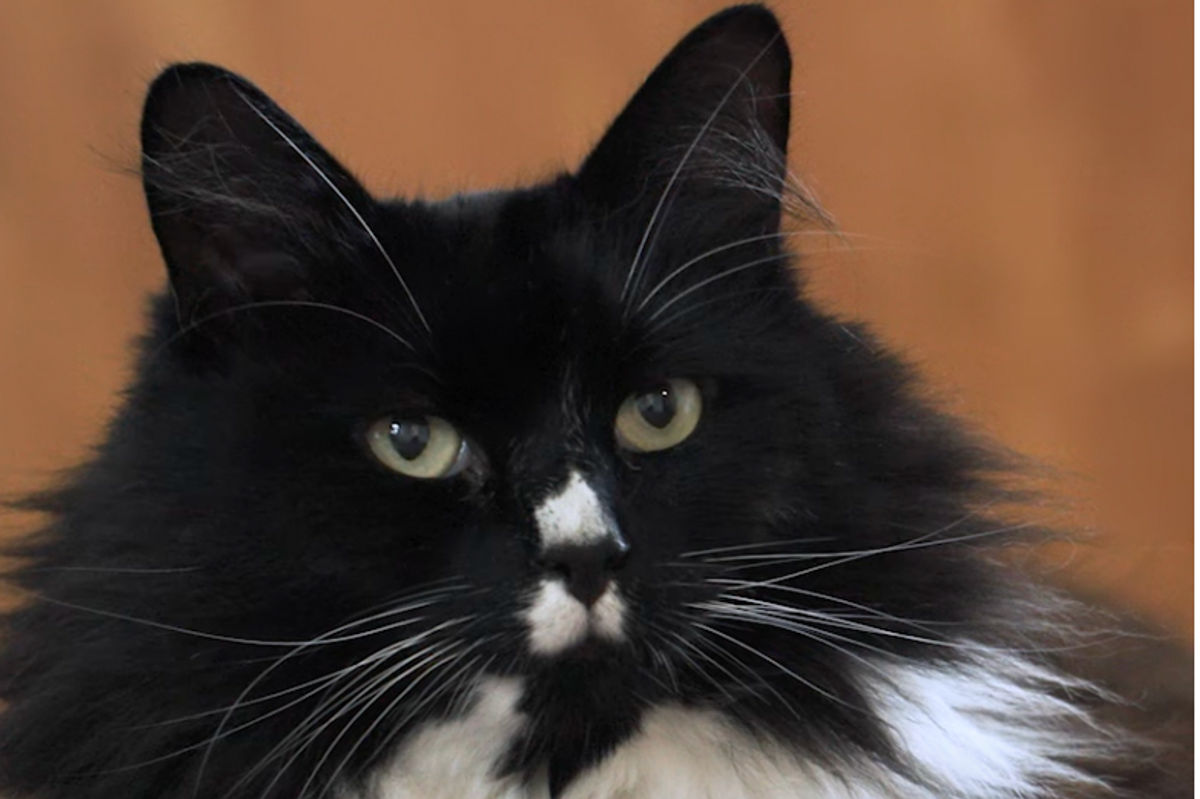The 2024 Cat of the Year winner spends its days comforting women who have been trafficked
Marley isn't just another cat. He's a true hero.

Cate are heroes too. And Marley is one of them.
We often hear stories about courageous dogs saving lives, but cats can be heroes too. They are so much more than than the aloof troublemakers their reputation makes them out to be (though, let’s not get it twisted…they are certainly also those things. They contain multitudes)
Let’s take Marley, for instance.
Marley, a seven-year-old, black and white feline known for his "incredible gift of empathy" beat out thousands of other entries vying to be named Cats Protection's National Cat of the Year 2024.
Marley’s award-winning contribution? Providing comfort to trafficked women.
Caritas Bakhita House in London, a safe house for women who have been enslaved, exploited and trafficked, is Marley’s home and workplace for four years.
Prior to that, he lived at a rescue shelter after being bullied by another cat in his family home. This former experience makes him so keen to the struggle of those he helps, surmises Karen Anstiss, the head of the house.
“He recognizes our guests’ trauma because he has suffered too,” she said.
Anstiss added that on any given day Marley can be seen “placing a paw” on guests’ legs to “let them know they’re not alone.” It’s a gesture often being “the first kindness they’ve experienced in years.” It’s as if he “knows” they are in need of a friend.
There was even one client, Anstiss noted, who was so “traumatized” she wouldn't talk to any of the staff—until Marely came along.
When not comforting guests, Marley can be seen acting as a muse for art therapy sessions, joining in on meals, hearing songs dedicated to him, or traipsing through his favorite patch of daisies, which, apparently, nobody else is allowed to touch. Certainly his VIP treatment is well earned.
And now, with his new Cat of The Year award, Marley is getting more well deserved recognition. His win began in the “incredible cats” category, which celebrates cats whose bond with their humans inspires extraordinary acts of love, in a public vote. He then won the overall prize by a panel of celebrity judges.
- YouTubewww.youtube.com
His winnings include a trophy and (probably more important to Marley) a $260-ish voucher for a pet store.
For this honor, and for all the women he has helped on their road to recovery, Anstiss said she is “so proud” of Marley, calling him “a wonderful example of the power of love.”
Do cats feel empathy?
Ask any cat lover, and they will give you a resounding “yes,” and then refer to various purrs, slow blinks and tail flickers as anecdotal evidence of emotional intelligence.
But there’s also some science to back this claim as well.
In one recent study from Italy, researchers presented a fan covered in ribbons to both cats and their owners. They observed that the cats seemed to follow their owner’s lead when interacting with this new and foreign object—shying away from it if their owners did so, or not reacting if their owner was neutral to it. In other words the casts picked up on their owner behaviors and changed their own accordingly.
In a different study, held by Nottingham Trent University, 3,000 cat owners surveyed were noted as having similar specific personality traits as their cats, again indicating that cats might be mirroring the personalities of their owners.
So take it from research, from cat owners, or from The Cat of the Year himself—felines are so much more empathetic than many give them credit for. Luckily, that’s changing.
- Epic coworker spat over two workplace cats, Jean and Jorts, just keeps getting funnier ›
- Guy's viral story of becoming an unexpected 'Cat Dad' is utterly adorable ›
- Couple builds mini-bedroom for their cat, complete with a TV for watching birds on YouTube ›
- UPS driver shares his hot take on holiday spending - Upworthy ›




 Student smiling in a classroom, working on a laptop.
Student smiling in a classroom, working on a laptop. Students focused and ready to learn in the classroom.
Students focused and ready to learn in the classroom.
 Musical ability sometimes shows itself at a very young age.
Musical ability sometimes shows itself at a very young age.
 Fish find shelter for spawning in the nooks and crannies of wood.
Fish find shelter for spawning in the nooks and crannies of wood.  Many of these streams are now unreachable by road, which is why helicopters are used.
Many of these streams are now unreachable by road, which is why helicopters are used. Tribal leaders gathered by the Little Naches River for a ceremony and prayer.
Tribal leaders gathered by the Little Naches River for a ceremony and prayer.
 A UPS truck with package deliveries.Image via Wikipedia
A UPS truck with package deliveries.Image via Wikipedia
 Empty nesters are happy with a job well done.
Empty nesters are happy with a job well done.  Older couple on vacation.
Older couple on vacation. Parents in Spain, Norway, Sweden, Portugal, and more are enjoying more time off to spend with family.
Parents in Spain, Norway, Sweden, Portugal, and more are enjoying more time off to spend with family. American parents would be happier with more time to spend with their families.
American parents would be happier with more time to spend with their families.